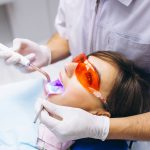Blog
Can You Keep Your Wisdom Teeth If They Don’t Hurt?
Are you among the many individuals who’ve been pondering whether to keep your wisdom teeth, even if they aren’t causing you any discomfort? It’s a common question and a significant decision to make. Can you keep your wisdom teeth if they don’t hurt? We understand your hesitation, and in this blog, we’ll dive into the details of this dilemma and provide you with the information you need to make an informed choice that’s best for your oral health.
The Dilemma: Wisdom Teeth That Don’t Hurt
Wisdom teeth, also known as third molars, are the last set of molars that typically emerge in the late teens or early twenties. For some individuals, these teeth come in smoothly and align correctly with the rest of the teeth. However, others experience impacted wisdom teeth, which can lead to complications.
Even if your wisdom teeth don’t hurt, they can still present potential problems down the road. Impacted wisdom teeth can lead to issues like crowding, infections, cysts, gum disease, and even damage to adjacent teeth.
Regular Monitoring and Evaluation
If your wisdom teeth aren’t causing pain, it’s tempting to think they’re harmless. However, regular monitoring by a dentist or oral surgeon is crucial.
Dental professionals can track the development of your wisdom teeth through regular check-ups and X-rays. This ongoing assessment helps determine whether there’s potential for future problems.
Recommendation: Schedule regular dental visits to ensure that your wisdom teeth are not causing hidden issues that could arise later.
Proactive Removal for Prevention
Even if your wisdom teeth aren’t hurting now, it doesn’t mean they won’t cause trouble in the future. Many dental professionals recommend proactive removal to prevent potential complications.
Removing wisdom teeth in your late teens or early twenties can reduce the likelihood of problems like crowding, infections, and damage to adjacent teeth. Recovery is often smoother when you’re younger.
Recommendation: Consult with your dentist or oral surgeon about the potential benefits of proactive wisdom teeth removal to prevent future issues.
Individualized Assessments
Every individual’s oral health is unique, and there’s no one-size-fits-all answer. That’s why individualized assessments are crucial.
Your dentist or oral surgeon will consider factors such as the position of your wisdom teeth, your overall oral health, and the potential for future problems before making a recommendation.
Recommendation: Engage in open discussions with your dental professional, ask questions, and understand the rationale behind their recommendation.
Conclusion
In the end, the decision to keep or remove your wisdom teeth when they don’t hurt is a personal one. While they may not be causing discomfort now, they could pose problems later. The best approach is to stay proactive by having your wisdom teeth regularly evaluated by a dental professional. Based on their expertise and individualized assessments, you’ll be better equipped to make an informed choice that aligns with your long-term oral health goals.
Remember, your dental professional is your partner in maintaining a healthy smile. So, if you’re hesitating about keeping your wisdom teeth if they don’t hurt, reach out to them for guidance.
Your oral health journey deserves thoughtful consideration and informed decisions.
For a comfortable and professional dental experience, schedule your appointment with us today!






